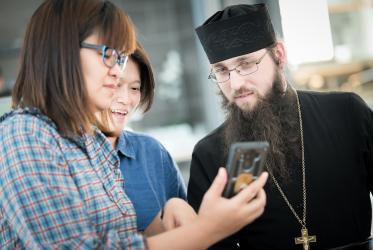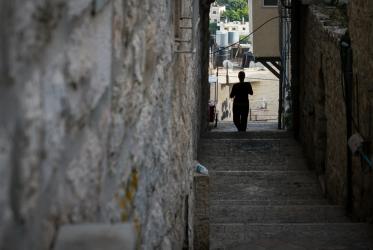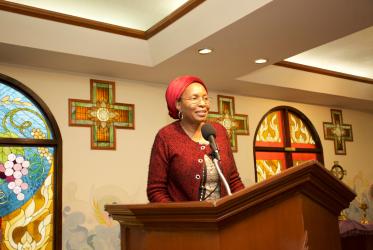The effects of certain types of experiences do not fade with time; rather they permeate deep into your existence to further broaden your understanding about the realities of life. For me the first Christian-Confucian Dialogue initiated by the World Council of Churches at South Korea was one such experience. It will stay with me for a long time and I will time travel back and forth from it to understand the complexities of inter-religious discussions.
The consultation provided me an opportunity to take a sneak-peek into the multiple religious identities of Korean Christians, who identified themselves as both ‘Confucian’ and ‘Christian’ rather than preferring either ‘Confucian’ or ‘Christian’. The choice of the conjunction ‘and’ over ‘or’ has significant implications.
When missionaries from the West came to Korea to preach Christianity, the natives were taught to have unquestioned allegiance to the new religion. The new converts had to cut all the ties with their existent way of life rooted in Confucianism, which had a history of more than thousand years in their homeland. As a result, they became a source of disdain for their immediate and extended families. Consequently, for some Korean Christians this imported notion of singular religious identity did not provide them with the promised peace as propagated by the missionaries.
Every day within themselves they battled with conflicting identities; Confucian versus Christian. Some fearless ones; however, won over this internal ideological battle and openly declared their dual religious citizenship; identifying themselves as ‘both’ Confucian ‘and’ Christian, alternatively not using ‘either’-‘or’.
The first two days of the consultation held at Seoul consisted of academic discourse on varied perspectives to Christians-Confucian Dialogue: Western Perspective, Korean Perspective, Feminist Perspective etc. In those discussions, I tried to grasp the nexus of similarities and differences that connect or disconnect Confucianism and Christianity. During the course of the sessions I realized that this approach was not as easy as it seemed.
One of the presenters at the conference noted how the question of deity in Confucianism and Christianity does not allow for a simple comparison: At the helm of Christianity there is God in heaven, the omnipotent deity; but within Confucianism there are different trends of thoughts.
In the teachings of a Confucian scholar named Xunzi; the predominant notion of heaven was about nature and unrelated to a transcendental deity. Xunzi famously argued that if people prayed for rain and it rains it is because it would happen anyway.
On the other hand, in the teachings of a Confucian scholar named Mencius, there is mention of inner self cultivation and alignment to the transcendent. The common feature in some of his writings is the need to align with the “the way” (dao) or “heaven/nature” (tian). Whether this refers to some transcendent absolute or correct order of things is a matter of dispute within the tradition.
Insights gained through such discussions, made me drop the idea to draw clear lines in my mind to demarcate what is Christian and what is Confucian. My take-away from these sessions was that a parallel understanding of Christian-Confucian traditions requires openness to accept blurred lines of thought or the gray areas of debate.
While the consultation at Seoul did give me enriching ideas of how deeply embedded Confucianism was in the Korean way of life, it was not until my exposure visits in Andong ("Confucianism capital of Korea") that I truly understood the significance of this. I was delighted that we got the audience of the 18th generation direct descendant of Yi To’egye, one of the greatest Confucian scholars in Korea, and had the opportunity to pay our respects at To’egye shrine as a part of a traditional ceremony.
The exposure visit gave participants an opportunity to understand Confucianism from the inside – much better than a typical class room style approach placing your religion at the center seeking to understand the other religion at the periphery.
On all the three nights of our stay at Andong, we were hosted at Confucian homes, families of eldest sons of prominent clans, who have commendably preserved their Confucian heritage. They welcomed us into their guest rooms, into their dining rooms stacked with authentic homemade Korean delicacies. They also let us see their most valued cultural jewels, their family libraries that contained interpretation of Confucian analects and their ancestral shrines with sacred tablets.
From all our discussions, I gathered that one of the main reasons for Christian-Confucian contention is the issue of ancestor veneration. They believed in preserving their ancestral lineage, so much so that some of them can trace it back to 28 generations. They told us that when their children become Christians or marry Christians they dissociated themselves from practices like ancestor veneration, a priced tradition that they and their forefathers unquestioningly carried from the past to the present but whose continuation into the future is becoming a cause of concern.
Most of them associated ancestor veneration as an intrinsic part of being Korean, impervious to religious inclinations. They expressed that disagreement over this issue was erecting a wall of discord between Christians and Confucians within their community. Nowadays, many Korean Christians do not participate in ancestor veneration ceremonies as they regard them as ancestor worship which goes against the core Christian belief that worship should only be directed to God.
During our stay in Andong, our team engaged in meaningful dialogues with the Confucian side addressing the above concern in a manner that was respecting their sentiments without undermining the tenets of our Christian belief. Most members of our group felt that this issue could be resolved if a distinction is made between the two words, ancestor worship and ancestor reverence. The latter finds place in diverse forms even within Christianity.
For instance, All Saints Day is celebrated by Churches with great fervor on 1st November to honor and pay tribute to holy saints and martyrs. Furthermore, several Orthodox Churches also have special days to commemorate the deaths of ancestors.
The team also felt that understanding and acceptance of differences with Christianity can facilitate action to reform some of the rigid Confucian ceremonies in a way that makes both sides feel at ease. Multiple religious belonging is an active area of study of the World Council of Churches. Further study and consultations need to be undertaken to understand it in the Korean as well as in the East Asian context in the coming years.
The Korean Confucian Christians or Christian-Confucians have set a strong example of hybrid religious identities in the world. I hope acceptance of multiple religious identities will find greater meaning in Korea as the ripples created by this dialogue expand into wider circles.
The organizers of this dialogue have indeed unleashed a new wave of following Christ beyond rigid boundaries. What is new about multiple identities after all? Perhaps the best way to sum up my impressions from this dialogue would be to quote Prof. Heup Young Kim, the youthful and energetic sexagenarian who organized this dialogue from the Korean side: Even the Christian God has (triune) multiple identities, no?






